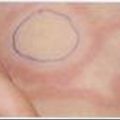10.3 Thyroid emergencies
Thyrotoxicosis
Clinical features
Raised levels of circulating thyroid hormone have predictable clinical effects depending on the organ system and are similar to the symptoms and signs of catecholamine excess (see Table 10.3.1). The onset of symptoms in Graves’ disease is usually insidious and variable in severity between patients. Severe ophthalmopathy or dermopathy is rare in children. Most patients with Grave’s disease will have a goitre characterized by diffuse, non-tender and symmetrical enlargement of the thyroid gland.
The clinical presentation of thyroid storm is of abrupt onset of high fever and marked tachycardia and hypertension with exaggerated features of hyperthyroidism (Table 10.3.1). Altered mental state is invariably present and may progress to seizures and coma.
Congenital hypothyroidism
Fortunately, the majority of infants with congenital hypothyroidism are diagnosed soon after birth via the newborn screening program. A small number of cases will be missed and present for medical attention because of symptoms of hypothyroidism. Suggestive symptoms and signs are listed in Table 10.3.2.
Hashimoto’s thyroiditis
Autoimmune thyroiditis is generally a condition of adult women. Adolescents may be affected. The clinical features are of insidious onset (Table 10.3.3). Diagnosis is confirmed with a TSH assay supplemented by thyroid hormone levels, thyroid autoantibodies and a thyroid scan. Referral to an appropriate specialist is highly recommended.




